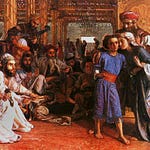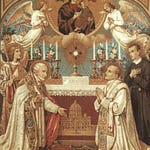Alexander the Great, after he had conquered Darius and subdued Persia, wished to gain the affection of that people, and so went about dressed in the Persian costume. In like manner God would appear to act. In order to draw towards Himself the affections of men, He clothed Himself completely after the human fashion, and appeared as Man: in shape found as a man (Phil. ii. 7). By this means He wished to make known the depth of the love which He bore to man: The grace of God our Saviour hath appeared to all men (Tit. ii. 11).
Man does not love Me, God would seem to say, because he does not see Me. I wish to make Myself seen by him and to converse with him, and thus make Myself loved: He was seen upon earth, and conversed with men (Baruch iii. 38).
The Divine love for man was extreme, and had been from all eternity: I have loved thee with an everlasting love, therefore have I drawn thee, taking pity on thee (Jer. xxxi. 3). But heretofore it had not appeared how great and inconceivable this love was that manifested itself when the Son of God showed Himself a little One in a stable on a bundle of straw: The goodness and kindness of God our Savour appeared (Tit. ii. 4). The Greek text reads: The singular love of God towards men appeared. St. Bernard says that from the beginning the world had seen the Power of God in creation, and His Wisdom in the government of the world; but only in the Incarnation of the Word was it seen how great was His Mercy. Before God made Man was seen upon earth, men could not conceive an idea of the Divine Goodness; therefore did He take mortal flesh, that, appearing as Man, He might make plain to men the greatness of His benignity.
And in what other way could the Lord better display to thankless man His goodness and His love? Man, by despising God, says St. Fulgentius, put himself aloof from God forever; and as man was unable to return to God, God came in search of him on earth. St. Augustine had already said this: "Because we would not go to the Mediator, He condescended to come to us."
I will draw them with the cords of Adam, with the bands of love (Osee. xi. 4). Men allow themselves to be drawn by love; the tokens of affection shown to them are a sort of chain which binds them, and, in a sense, forces them to love those by whom they are loved. For this end the Eternal Word chose to become Man, to draw to Himself by the greatest proof of affection the love of men. God was made Man that God might be more easily loved by man. It seems that our Redeemer wished to signify this very thing to a devout Franciscan called Father Francis of St. James, as is related in the Franciscan Diary for the 15th of December. Jesus frequently appeared to him as a lovely Infant; and the holy friar longed in his fervour to hold Him in his arms, but the sweet Child always fled away; whereupon the servant of God lovingly complained of this. One day the divine Child again appeared to him; but how? He appeared with golden chains in His hands wherewith they should be bound as prisoners one with the other and never to be separated. Francis, emboldened at this, fastened the chains to the foot of the Infant, and bound Him to his heart; and, in very truth, from that time forward it seemed to him as if he saw the beloved Child in the prison of his heart, a perpetual Prisoner. That which Jesus did with this His servant He really has done with all men when He Himself became Man; He wished to be, as it were, enchained by us with such a prodigy of love and at the same time to enchain our hearts by obliging them to love Him, according to the prophecy of Osee: I will draw them with the cords of Adam, with the bands of love.
In divers ways, says St. Leo, had God already benefited man; but in no way has He more clearly exhibited the excess of His bounty than in sending him a Redeemer to teach him the way of salvation, and to procure for him the life of grace. "The Goodness of God has imparted gifts to the human race in various ways; but it surpassed the ordinary bounds of its abundant kindness when, in Christ, Mercy Itself came down to those who were in sin, Truth to those who were wandering in error, and Life to those who were dead."













Share this post